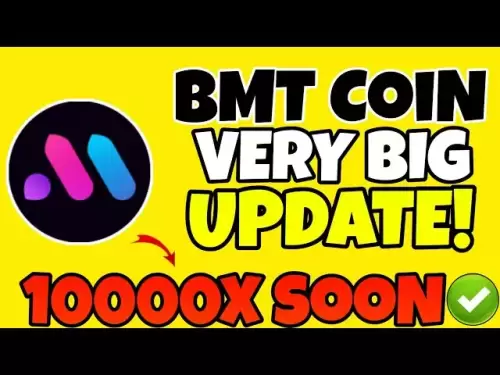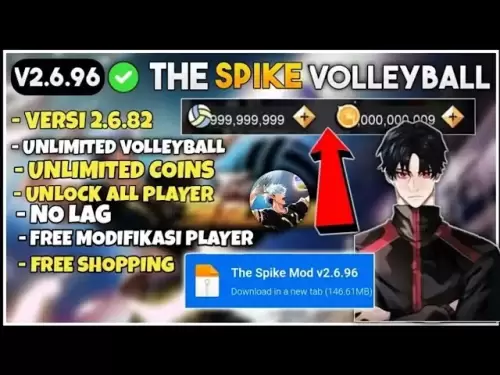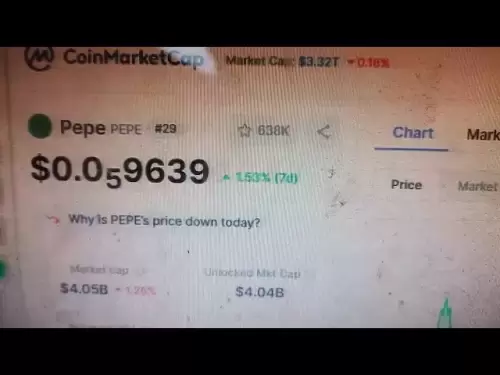-
 Bitcoin
Bitcoin $108,641.9143
0.44% -
 Ethereum
Ethereum $2,539.5956
0.97% -
 Tether USDt
Tether USDt $1.0007
0.04% -
 XRP
XRP $2.2777
2.50% -
 BNB
BNB $660.2073
0.79% -
 Solana
Solana $151.1059
2.08% -
 USDC
USDC $1.0004
0.05% -
 TRON
TRON $0.2838
-0.03% -
 Dogecoin
Dogecoin $0.1698
3.57% -
 Cardano
Cardano $0.5835
1.74% -
 Hyperliquid
Hyperliquid $39.4787
0.07% -
 Sui
Sui $2.9330
1.09% -
 Bitcoin Cash
Bitcoin Cash $489.1023
1.31% -
 Chainlink
Chainlink $13.3775
1.61% -
 UNUS SED LEO
UNUS SED LEO $9.0201
-0.04% -
 Avalanche
Avalanche $18.2176
2.06% -
 Stellar
Stellar $0.2417
1.98% -
 Toncoin
Toncoin $2.9355
7.33% -
 Shiba Inu
Shiba Inu $0.0...01181
3.23% -
 Litecoin
Litecoin $87.9775
1.54% -
 Hedera
Hedera $0.1569
1.54% -
 Monero
Monero $316.0995
1.13% -
 Polkadot
Polkadot $3.3970
1.36% -
 Dai
Dai $1.0002
0.02% -
 Ethena USDe
Ethena USDe $1.0002
0.00% -
 Bitget Token
Bitget Token $4.4094
0.33% -
 Uniswap
Uniswap $7.4035
6.32% -
 Pepe
Pepe $0.0...01016
4.88% -
 Aave
Aave $275.5935
1.55% -
 Pi
Pi $0.4565
-0.89%
How to import private keys from other wallets in Exodus?
Exodus prioritizes security by using seed phrases, not direct private key imports, to restore wallets. Incorrectly importing keys risks fund loss; always verify addresses before transferring.
Mar 20, 2025 at 05:21 pm
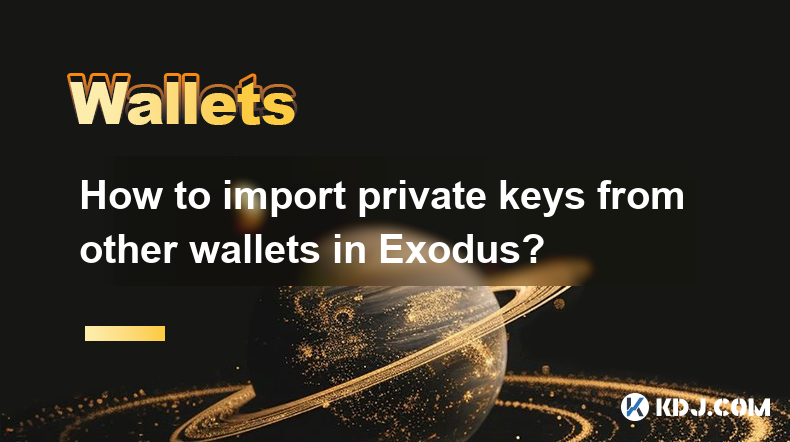
Key Points:
- Exodus does not directly support importing private keys in the traditional sense. Instead, it focuses on importing wallets using seed phrases or recovery keys.
- Understanding the risks associated with importing private keys is crucial; incorrect import could lead to loss of funds.
- The process varies depending on the source wallet and the type of cryptocurrency involved.
- Always verify the receiving address before sending any funds.
- Security best practices should be followed throughout the process.
How to Import Private Keys from Other Wallets in Exodus?
Exodus doesn't offer a direct "import private key" function like some other wallets. This is a deliberate security measure. Directly importing private keys increases the risk of errors and potential hacks. Instead, Exodus prioritizes secure methods like importing using your seed phrase or recovery key. This approach safeguards your assets by relying on the secure recovery mechanism built into the original wallet.
Understanding Seed Phrases and Recovery Keys:
Your seed phrase (or recovery key) is a series of words that acts as a master key to your cryptocurrency holdings. It's crucial to store this phrase securely, offline and in multiple locations. This phrase allows you to recover your wallet and access your funds if you lose your device or need to switch wallets. Never share your seed phrase with anyone.
Importing Wallets Using Seed Phrases:
To access your crypto assets in Exodus, you'll typically use the seed phrase from your previous wallet. This method ensures that you don't need to handle potentially risky private keys directly. The process varies slightly depending on the cryptocurrency, but generally involves creating a new wallet in Exodus for the specific cryptocurrency and then using the seed phrase during the setup process. Exodus will guide you through this process.
The Importance of Verification:
Before transferring any funds, double-check the receiving address in Exodus. Ensure that the address you're sending to is the correct one for the specific cryptocurrency you are transferring. A single incorrect character can result in irreversible loss of funds. Take your time and carefully compare the addresses.
Addressing Specific Wallet Scenarios:
The process of transferring assets from other wallets depends heavily on the original wallet's structure. For example, if you're transferring from a hardware wallet like Ledger or Trezor, you would use the seed phrase provided by the hardware wallet manufacturer to recreate your wallet within Exodus. Each hardware wallet has its own specific recovery process. Never use a third-party tool or website to access your seed phrase.
Dealing with Paper Wallets:
If you're using a paper wallet, carefully transcribe the private keys and associated addresses. Then, you’ll need to find the corresponding cryptocurrency in Exodus and carefully input the private key and address. However, be aware that the private key import method is not directly supported. You'll likely need to create a new wallet in Exodus and then transfer your funds from your paper wallet to this new wallet.
Security Best Practices:
Always ensure you're using the official Exodus wallet and not a fraudulent copy. Download the software from the official Exodus website. Use strong passwords and enable two-factor authentication (2FA) for an extra layer of security. Keep your computer and software updated to protect against known vulnerabilities.
Dealing with Different Cryptocurrency Types:
The process of importing funds may vary depending on the type of cryptocurrency. Bitcoin, Ethereum, and other cryptocurrencies each have their own unique address formats and transaction procedures. Make sure you're using the correct cryptocurrency type in both your source wallet and Exodus.
What if I don't have my seed phrase?
Without your seed phrase or recovery key, regaining access to your funds is extremely difficult, and likely impossible. The security of your cryptocurrency relies heavily on having secure access to your seed phrase. It's essential to keep your seed phrase safe and secure.
Can I import a single private key?
No, Exodus does not support the direct import of individual private keys. The primary method for accessing funds is through importing your seed phrase. This approach is safer and less error-prone.
What if I made a mistake during the import process?
If you suspect you've made a mistake during the import process, immediately contact Exodus support. However, it is important to understand that recovering funds after an incorrect import is unlikely, especially without your seed phrase.
Is it safe to import private keys into Exodus?
While Exodus doesn't directly support importing private keys, the inherent risks associated with handling private keys remain. The safest and recommended method is to use your seed phrase. This method avoids the potential pitfalls of direct private key handling.
Are there any third-party tools to help with this process?
We strongly advise against using any third-party tools to help with importing private keys into Exodus. Using unofficial tools could expose your funds to risks. Stick to the official Exodus software and support channels.
Disclaimer:info@kdj.com
The information provided is not trading advice. kdj.com does not assume any responsibility for any investments made based on the information provided in this article. Cryptocurrencies are highly volatile and it is highly recommended that you invest with caution after thorough research!
If you believe that the content used on this website infringes your copyright, please contact us immediately (info@kdj.com) and we will delete it promptly.
- Litecoin Breakout Watch: What Traders Need to Know Now
- 2025-07-06 16:50:13
- Bitcoin, Solana, Ethereum: Decoding the Latest Buzz on the Blockchain
- 2025-07-06 16:50:13
- Widnes Resident's 50p Could Be Your Ticket to Easy Street: Rare Coin Mania!
- 2025-07-06 16:55:13
- Bitcoin, Solaris Presale, and Token Rewards: What's the Buzz?
- 2025-07-06 16:55:13
- Ethereum Under Pressure: Price Drop Amid Global Uncertainties
- 2025-07-06 17:00:13
- XRP, SEC Case, and Prosperity: A New Era for XRP Holders?
- 2025-07-06 17:10:13
Related knowledge

How to cancel a pending transaction in Phantom wallet?
Jul 03,2025 at 07:21pm
Understanding Pending Transactions in Phantom WalletA pending transaction in the Phantom wallet occurs when a user initiates a transfer or interaction with the Solana blockchain, but it hasn't yet been confirmed by the network. This can happen due to various reasons such as low transaction fees, network congestion, or incorrect gas settings. It's import...

How to see the estimated value of my tokens in Phantom wallet?
Jul 04,2025 at 12:21am
What is Phantom Wallet?Phantom wallet is one of the most popular cryptocurrency wallets designed for the Solana blockchain. It allows users to store, send, receive, and manage various tokens built on Solana, including SPL tokens and NFTs. The wallet offers a user-friendly interface, making it accessible for both beginners and advanced users in the crypt...

How to lock my Phantom wallet extension?
Jul 03,2025 at 11:14am
What Is the Phantom Wallet and Why Lock It?The Phantom wallet is a popular non-custodial cryptocurrency wallet designed for interacting with the Solana blockchain. Supporting both browser extensions and mobile apps, Phantom allows users to store, send, receive, and stake SOL tokens, as well as interact with decentralized applications (dApps). Securing y...

Does Phantom wallet offer two-factor authentication (2FA)?
Jul 03,2025 at 09:00am
Understanding Phantom Wallet and Its Security FeaturesPhantom wallet is a widely used non-custodial cryptocurrency wallet that supports the Solana blockchain. It allows users to store, send, receive, and interact with decentralized applications (dApps) seamlessly. As security is a top priority for any crypto wallet user, security features like two-facto...
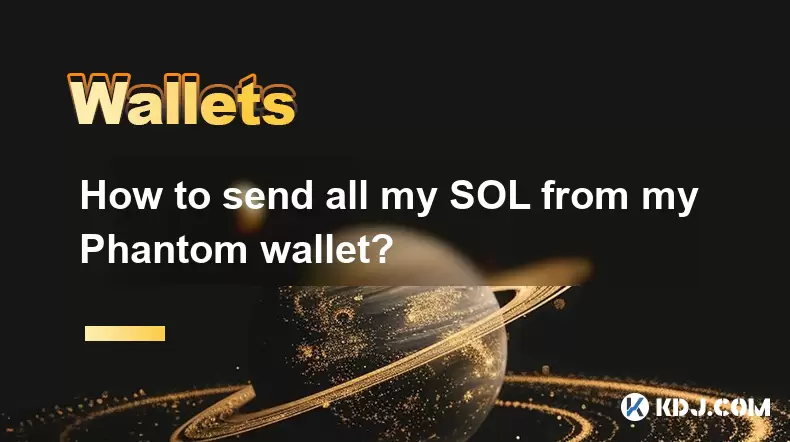
How to send all my SOL from my Phantom wallet?
Jul 06,2025 at 10:00am
Preparing to Send SOL from Your Phantom WalletBefore initiating any transaction, it is crucial to ensure that your Phantom wallet is fully set up and connected to the correct network. Phantom supports multiple networks, but for sending SOL, you must be on the Solana blockchain. Confirm this by checking the network indicator in the top-right corner of th...

What is "rent" on Solana and how does it affect my Phantom wallet?
Jul 02,2025 at 08:35pm
Understanding 'Rent' on SolanaIn the context of Solana, the term 'rent' refers to a storage fee that users pay for maintaining data on the blockchain. Unlike Ethereum, where storage costs are paid once via gas fees during contract deployment, Solana implements a recurring cost model to ensure efficient usage of network resources. This means that any acc...

How to cancel a pending transaction in Phantom wallet?
Jul 03,2025 at 07:21pm
Understanding Pending Transactions in Phantom WalletA pending transaction in the Phantom wallet occurs when a user initiates a transfer or interaction with the Solana blockchain, but it hasn't yet been confirmed by the network. This can happen due to various reasons such as low transaction fees, network congestion, or incorrect gas settings. It's import...

How to see the estimated value of my tokens in Phantom wallet?
Jul 04,2025 at 12:21am
What is Phantom Wallet?Phantom wallet is one of the most popular cryptocurrency wallets designed for the Solana blockchain. It allows users to store, send, receive, and manage various tokens built on Solana, including SPL tokens and NFTs. The wallet offers a user-friendly interface, making it accessible for both beginners and advanced users in the crypt...

How to lock my Phantom wallet extension?
Jul 03,2025 at 11:14am
What Is the Phantom Wallet and Why Lock It?The Phantom wallet is a popular non-custodial cryptocurrency wallet designed for interacting with the Solana blockchain. Supporting both browser extensions and mobile apps, Phantom allows users to store, send, receive, and stake SOL tokens, as well as interact with decentralized applications (dApps). Securing y...

Does Phantom wallet offer two-factor authentication (2FA)?
Jul 03,2025 at 09:00am
Understanding Phantom Wallet and Its Security FeaturesPhantom wallet is a widely used non-custodial cryptocurrency wallet that supports the Solana blockchain. It allows users to store, send, receive, and interact with decentralized applications (dApps) seamlessly. As security is a top priority for any crypto wallet user, security features like two-facto...

How to send all my SOL from my Phantom wallet?
Jul 06,2025 at 10:00am
Preparing to Send SOL from Your Phantom WalletBefore initiating any transaction, it is crucial to ensure that your Phantom wallet is fully set up and connected to the correct network. Phantom supports multiple networks, but for sending SOL, you must be on the Solana blockchain. Confirm this by checking the network indicator in the top-right corner of th...

What is "rent" on Solana and how does it affect my Phantom wallet?
Jul 02,2025 at 08:35pm
Understanding 'Rent' on SolanaIn the context of Solana, the term 'rent' refers to a storage fee that users pay for maintaining data on the blockchain. Unlike Ethereum, where storage costs are paid once via gas fees during contract deployment, Solana implements a recurring cost model to ensure efficient usage of network resources. This means that any acc...
See all articles





















